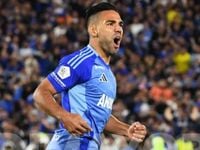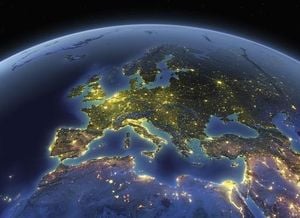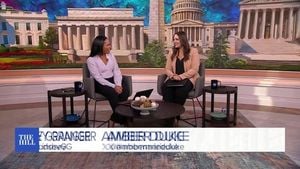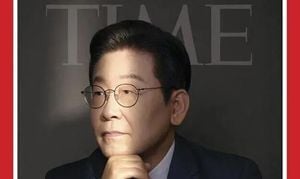Radamel Falcao García, one of Colombia’s most iconic footballers, has always been known for his clutch goals and lionhearted play. But in a recent, revealing interview with former teammate Mario Suárez, Falcao pulled back the curtain on the personal and professional challenges that have shaped his storied career. From anxiety-ridden nights in Bogotá with Millonarios to the heartbreak of missing the 2014 World Cup, and the bittersweet memories of transfer sagas in Europe, Falcao’s journey has been anything but straightforward.
After parting ways with Millonarios in July 2025 following a mutual decision not to renew his contract, Falcao has found himself at a crossroads. The veteran striker, now a free agent, has been spending time with family and friends, reflecting on both triumphs and trials. His candid conversation with Suárez, aired on the debut episode of ‘El Camino de Mario,’ offered fans an unfiltered glimpse into the man behind the legend.
Falcao’s return to Colombian football was always destined to be headline news. The anticipation was sky-high when he donned the Millonarios jersey, fulfilling a childhood dream and instantly becoming the league’s marquee signing. Yet, as Falcao himself admitted, the reality was far more complicated than the fairytale many imagined. “When I arrived in Bogotá, people were all over me. I felt overwhelmed, suffocated, and started having episodes of anxiety. You can’t breathe, you feel like you’re not breathing, and you end up spending the whole night awake. I didn’t know what was happening to me, and it just made the anxiety worse,” he confessed to Suárez.
The pressure, both internal and external, took a heavy toll. Falcao described waking up in the middle of the night, gasping for air, sometimes needing to leave the room to calm himself. “I would wake up and tell Lore (Lorelei, his partner), ‘I feel like I’m suffocating,’ and I’d have to go out into the hallway because I felt like I couldn’t breathe. There was a day I told the coach, ‘I didn’t sleep at all, I spent the night awake; let me rest,’” Falcao recalled, referencing then-coach Alberto Gamero. The striker’s vulnerability in sharing these moments is as striking as any of his goals.
Life in Bogotá brought its own set of challenges. The city’s notorious traffic and the constant attention from fans made daily routines nearly impossible for the García family. “Bogotá is a complex city. It’s wonderful, it has a lot of wealth. Mobility is very difficult. For us as a family, it ends up being complex. I can’t go to a shopping mall, or if you go to a restaurant or the cinema, you have to go through another door. Sharing with family outdoors was tough, and people don’t understand that,” Falcao explained. For a man used to the anonymity of European cities, the fishbowl existence in Colombia’s capital was a rude awakening.
The adaptation to Colombian football proved just as daunting. Falcao, who had dazzled on the pristine pitches of Spain and France, found the playing conditions back home to be a shock. “The fields are not like in Europe, you suffer, there are some pitches that are like training in the sand of Miami. The game ends up being slow, but the pitch doesn’t give you speed, it eats your legs,” he lamented. Despite the respect shown by fans in most stadiums, Falcao made a pointed call for improvements to infrastructure in the domestic league. “Getting to know Colombian football took me time, the pitches are nothing like Europe’s. You suffer, you play on fields that feel like sand. The game becomes slow and it wears out your legs.”
Falcao’s time at Millonarios, while short of silverware, left a lasting impression on supporters. He may not have lifted a trophy with the ‘embajadores,’ but his presence elevated the league’s profile and inspired a new generation of Colombian players. Still, when asked about the clubs closest to his heart, Falcao didn’t hesitate to name Atlético de Madrid as the most special, followed by Porto and Monaco. His emotional ties to the Spanish capital run deep, and it’s clear that his time with the ‘colchoneros’ is a chapter he cherishes above all.
The conversation with Suárez also turned to the darkest moment of Falcao’s career: the knee injury in 2014 that dashed his dreams of starring at the World Cup in Brazil. The memory remains raw. “I remember that night, they flew me home by private plane and calls were already being made. I knew, the doctor had done the tests and my knee was moving all over the place. They hadn’t confirmed it yet, but deep down I knew. It was a moment of struggle, difficult, I asked: ‘God, why is this happening to me?’” Falcao recounted. Despite coach José Pékerman’s hope and willingness to wait until the last moment, reality prevailed. “It was a huge blow. I tried to be positive, telling myself I’d do everything possible and then decide. I think José (Pékerman) would have taken me, he had faith and waited until the last minute. He had to submit the list and the night before he called me to see what we’d do. I told him I wasn’t ready. We were in camp in Buenos Aires. I hadn’t cried until then, but when they left on the bus and I left in the car with my friend, I broke down and couldn’t hold it in anymore.”
The wounds from that missed opportunity have never fully healed, for either Falcao or the Colombian faithful. It was, by all accounts, the prime of his career—robbed by cruel fate.
Transfer drama has also been a recurring theme in Falcao’s journey. In 2012, as rumors swirled about a blockbuster move to Real Madrid, Falcao found himself in a surreal situation involving Real’s president Florentino Pérez and a serviette. “They put the serviette in front of me, Casillas was there, the Atlético press officer was there, and they told me to hide the serviette. It was awkward, Florentino was there wanting me to sign it. I don’t know how true it was that there were negotiations. Someone from Real Madrid called me, there was interest, but it meant a lot to Atlético. It was a complex situation, and I was already identified with Atleti and what it meant to them,” Falcao said. His loyalty to Atlético ultimately won out, and the transfer never materialized.
Falcao also revealed disappointment that Atlético didn’t fight harder to keep him. “For me, that was a bit disappointing from Atlético de Madrid. I have no resentment and understand the situation, they had to sell me like they did with Kun Agüero or Fernando Torres. But I thought I’d get an offer to try and keep me, but I never received anything. I have a good relationship with Miguel, but I never saw any effort to keep me. On the contrary, it was about where they could sell me best,” he admitted. Later, a potential return to Atlético was scuttled when the coaching staff declined to approve the move, a decision Falcao believes could have been handled with more respect.
Rounding out the interview, Falcao reflected on his brief but meaningful stint with Rayo Vallecano, which came about after a whirlwind series of last-minute negotiations. It’s clear that for Falcao, football has always been about more than just the game—it’s about loyalty, family, and enduring the highs and lows with grace.
As Falcao weighs his next move as a free agent, his story stands as a testament to resilience and authenticity. Whether he laces up his boots again or not, the ‘Tigre’ has already left a mark on world football that won’t soon be forgotten.




